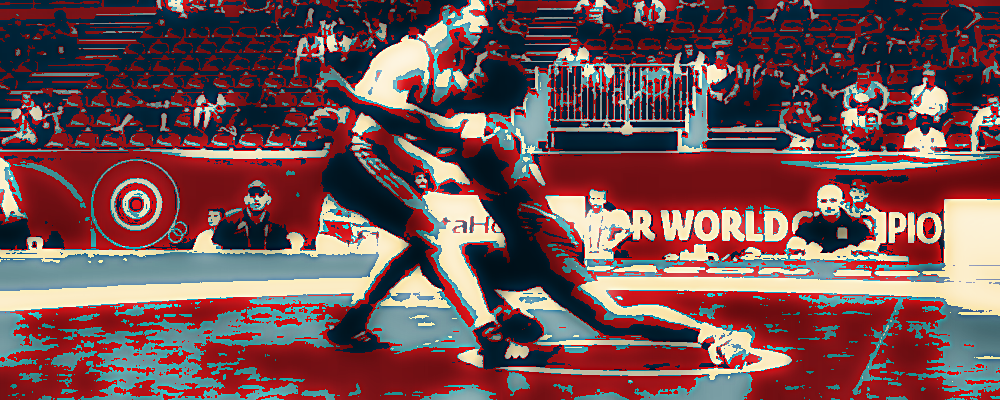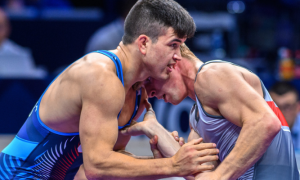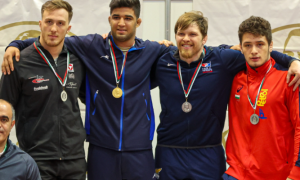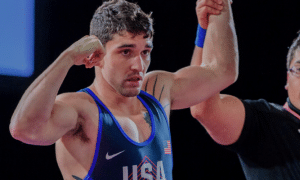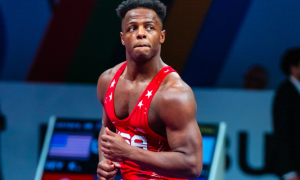It has been nearly a week since the 2016 edition of the Junior Greco Roman World Championships came to a close and as you know by now, there were a few bright spots for the US. Both Taylor LaMont (60 kg) and G’Angelo Hancock (96 kg) earned bronze medals for their performances. LaMont, who came ever-so-close last year as a Cadet, was down 3-1 in the second period against Olesandr Hrushyn (UKR) before a late takedown put the score at 3-3, also giving him criteria. A caution and two on Hrushyn right at the end widened the gap to 5-3, but it didn’t matter by then. It was an impressive tournament overall for LaMont, who didn’t even give up an offensive point in his semifinal loss to eventual silver medalist Etienne Kinsinger (GER).
Hancock improved mightily on his performance from last year’s Junior Worlds. The 19-year old wrestled a tough and inspired match in a losing effort versus Giorgi Melia (GEO) but came back to put on a controlled, composed clinic against Yuta Nara (JPN) in the bronze medal bout. The 3-0 win gave Hancock his first World medal and he will be looking to add another one when he hits the mat at the University World Championships, which take place next month in Turkey.
Aside from the two medalists, there were other US showings worth noting. Randon Miranda (50 kg) sparkled in a first round win over Hideto Yamaguchi (JPN). He then fell victim to finalist Ilkhom Bakhromov (UZB) in the quarterfinals before seeing his podium hopes dashed altogether by Iranian upstart Mehdi Nejad in his repechage bout. Nicholas Reenan (84 kg) put on a stunning display of offensive wrestling when faced up with Ahmed Hassan Ahmed (EGY). A takedown, a headlock and turn, and then another takedown were all it took for Reenan to escape his first match of the day unscathed. Unfortunately for Reenan, he couldn’t seem to get going in the next bout, getting tech’ed out by Anton Sakhno (AZE).
US fans who love watching Kamal Bey (74 kg) in action got their money’s worth in his first two matches. Bey put together back-to-back dominating demonstrations of the kind of firepower he is capable of, easily breezing past Ze Chen (CHN) and Reuven Zimkind (ISR) respectively. In the quarterfinals, Bey met up with Zotlan Levai (HUN), 2016 Junior European gold medalist and a strong favorite in this event. There was just a little history here — Bey defeated Levai’s brother Tamas earlier in the year at the Black Diamond Cup. A dose of brotherly revenge was dished out in Macon, as Levai controlled the tempo en-route to a 10-2 technical fall win over the talented American competitor.
Team USA finished in eighth place, six spots up from where the squad wound up last year and nine spots better than the year before that. This would seem to be an indication that all in all, big improvements have been made with more coming. Five of the eight US competitors are full-time Greco, and that hints at continued steps forward down the road. So while there may have been a couple of medal contenders who didn’t quite see it all the way through just yet, clearly, the US Greco Roman program is making strides.
Golden Grand Prix moved to November
For those of you looking forward to the annual Golden Grand Prix in Baku, Azerbaijan later this month, you’re going to have to wait a little longer. The new date(s) will be November 24th through the 26th, which is actually right around the time it took place last year. Apparently, there is an event in Baku at the end of the September so things needed to be switched around. For the US, this might actually be a good thing. Athletes who may have been unavailable in September will be back training by then, giving the US team more roster options.
UWW proposes two-day tournament format
At the Bi-Annual Congress held in Macon, France yesterday, United World Wrestling president Nenad Lalovic addressed the possibility of moving events to a two-day format. Part of the impetus for this change is to improve the promotional aspect of advances through a tournament. For instance, there would be more opportunities to hype gold medal matches and medal matches in general. Also, the thinking is that a tournament run over two-days would deter unhealthy weight cuts. Nothing was decided for certain, though it would seem that whatever alterations do wind up being made will see a slow roll-out, considering that events are already locked down scheduling-wise for the next year and change.
UWW also announced the introduction of a new program to educate officials and in the process adopted the IOC’s “Code of Ethics” (which almost seems like a paradox). Being that UWW is focusing on an educational program for officials, this might seem to suggest that no changes to the rules are coming down the pike anytime soon.
What’s coming up here
- The new “Coach Lindland’s Report” will be available tomorrow with a recap of the Junior Worlds, Senior news, and more.
- An athlete interview, a good one. A timely one.
- A special look at Spenser Mango’s career on the heels of his retirement last April.
- A new “Memorable Matches” segment.
Questions? Concerns? Feel like reaching out? Do so on Twitter, Facebook, and Instagram!

Notice: Trying to get property 'term_id' of non-object in /home/fivepointwp/webapps/fivepointwp/wp-content/themes/flex-mag/functions.php on line 999

